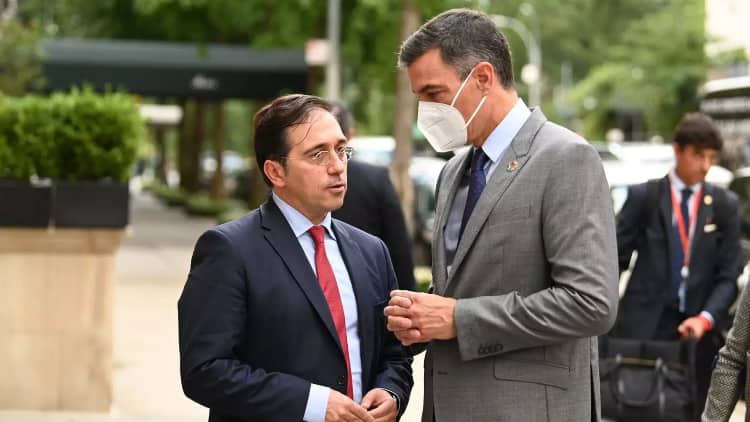Ángel Collado
With his cabinet internally divided and his parliamentary allies constantly complaining, another front has opened up for Pedro Sánchez, that of relations with Algeria, which leaves the government at its worst moment since it came to power four years ago.
The swings on the Sahara – from welcoming Polisario chief Brahim Gali to Spain to surrendering to the interests of Mohammed VI in less than a year – remain unexplained and encourage the theory of blackmail by the Moroccans.
The current head of the Spanish government, the first to be associated in power with the far left and pro-independence supporters, has also broken old foreign policy consensuses and does not even inform the main opposition party of the motives or benefits of the political shift in the Maghreb. He did not do so with Pablo Casado last year, nor does he bother to do so now with Alberto Núñez Feijóo, whom he even accuses of being on the side of the Algerians.
Sánchez forgets the traditional and complicated balancing act that all governments of democracy, PSOE and PP, have done to get along with Morocco and, at the same time, with Algeria, Spain’s main gas supplier for more than three decades.
The Treaty of Friendship, Cooperation and Good Neighbourliness signed with Algiers, now suspended, which was fundamental for immigration control and anti-terrorist matters, dates back to 2002 and was promoted and signed by the then head of the Spanish government, José María Aznar. The commitment to the North African country’s gas supply goes back much further, to the governments of the Socialist Felipe González in the 1980s.
In foreign policy, any precedent leaves Sánchez in a bad light compared to his predecessors in office, both in relations with the Maghreb and in trust with the United States. The current head of government remains uninvited to the White House despite following the Pentagon’s instructions to the letter in relation to Morocco and being the organiser of the next NATO summit to be held in Madrid on 29-30 September. He has to make do with an aside during the meeting and joint photos at official events.
The Democratic administration’s distrust of a Spanish government is as unprecedented as the composition of Sánchez’s cabinet, with five communist ministers. Then there are his far-left and separatist partners that include the Catalans who flirted with Putin’s emissaries in the 2017 secessionist attempt. Almost all of Sánchez’s allies, those who brought him to power in 2018, are avowed anti-Atlantists with the exception of the Basque nationalists of the PNV.
In the lurch towards Moroccan control of the Sahara, the president of the government still has no parliamentary support beyond the 120 deputies that the PSOE has in the 350-member Congress. No other political force, neither the opposition nor its partners, endorses or understands him, as was confirmed in last week’s plenary session. Nor did Sánchez explain the benefits for Spain of his support for Mohammed VI’s expansionist plans beyond a return to the previous situation, which is the normality that existed prior to the rupture of relations provoked by his own rescue of Gali.
In the Popular Party, almost more annoyed by the fact that they were not informed by the government than by the pro-Moroccan turn itself, which they assume was forced by Biden, they still do not understand the breakdown of consensus on such an important state issue. And it is this lack of explanations, both in Parliament in public and in the private sphere in non-existent relations with the opposition, that has led Feijóo’s team to give credence to the theory of Moroccan blackmail.
The government itself reported the spying on Sánchez’s mobile phone through the Pegasus system and on the same dates of the assaults by immigrants on the border with Morocco, which were permitted or organised by the regime of Mohamed VI. The data add up and the president of the government has not yet denied anything in the face of a new crisis that has thrown him off balance less than a week before the Andalusian regional elections and when he is about to host NATO, an event at which he hoped to improve his international image.







